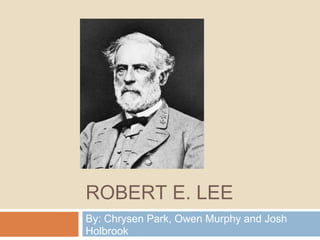
Robert E. Lee Powerpoint Presentation
- 1. ROBERT E. LEE By: Chrysen Park, Owen Murphy and Josh Holbrook
- 2. Early Life 1. Lee was born at Stratford Hall Plantation in Westmoreland County, Virginia on January 19, 1807. 2. Lee entered West Point in the summer of 1825. At the time, the focus of his curriculum was engineering. 3. Robert Lee attended school at Eastern View.
- 3. Marriage and Family 1. Robert was married to Mary Anne Curtis Lee on June 30, 1831 2. Robert had 7 children: George Washington Custis Lee Mary Custis Lee William Henry Fitzhugh Lee Anne Carter Lee Eleanor Agnes Lee Robert Edward Lee, Jr.
- 4. View on Slavery 1. Since the end of the Civil War, it has often been suggested Lee was in some sense opposed to slavery. Lee supported civil rights for all, as well as a system of free public schools for blacks, but dissented regarding black suffrage. 2. "In this enlightened age, there are few I believe, but what will acknowledge, that slavery as an institution, is a moral & political evil in any Country. It is useless to expatiate on its disadvantages. I think it however a greater evil to the white man than to the black race, & while my feelings are strongly enlisted in behalf of the latter, my sympathies are more strong for the former. The blacks are immeasurably better off here than in Africa, morally, socially & physically. The painful discipline they are undergoing, is necessary for their instruction as a race, & I hope will prepare & lead them to better things. How long their subjugation may be necessary is known & ordered by a wise Merciful Providence." - Robert E. Lee
- 5. Civil War 1. Lee wanted all peaceful ways of resolving the differences between North and South. 2.The commanding general of the Union Army, Winfield Scott, told Lincoln he wanted Lee for a top command. Lee accepted a promotion to colonel on March 28, 1863 3.Lee turned down an April 18 offer by presidential aide Francis P. Blair to command the defense of Washington D.C. as a major general, as he feared that the job might require him to invade the South.
- 6. Civil War Continued 1. Lee resigned from the Army on April 20 and took up command of the Virginia state forces on April 23 2. At the outbreak of war, Lee was appointed to command all of Virginia's forces 3. Lee's first field assignment was commanding Confederate forces in western Virginia, where he was defeated at the Battle of Cheat Mountain and was widely blamed for Confederate setbacks. 4. Early in the war, his men called him "Granny Lee" because of his allegedly timid style of command.
- 7. Civil War Continued... 1. Lee then launched a series of attacks, the Seven Days Battles, against McClellan's forces. Lee's assaults resulted in heavy Confederate casualties. 2. Lee defeated another Union army at the Second Battle of Bull Run. Within 90 days of taking command, Lee had run McClellan off the Peninsula, defeated Pope at Second Manassas. 3. In the summer of 1863, Lee invaded the North again, marching through western Maryland and into south central Pennsylvania. He encountered Union forces under George G. Meade at the three-day Battle of Gettysburg in Pennsylvania in July; the battle would produce the largest number of casualties in the American Civil War.
- 8. After the War 1. Lee supported President Johnson's plan of Reconstruction, but joined with Democrats in opposing the Republicans who demanded measures against the South, distrusted its commitment to the abolition of slavery. 2. Lee hoped to retire to a farm of his own, but he accepted an offer to serve as the president of Washington College (Washington and Lee University) in Lexington, Virginia, and served from October 1865 until his death.
- 9. Illness and Death 1. On September 28, 1870, Lee suffered a stroke. He died two weeks later, shortly after 9 a.m. on October 12, 1870, in Lexington. 2. His last words on the day of his death, were "Tell Hill he must come up. Strike the tent". 3. He was buried underneath Lee Chapel at Washington and Lee University, where his body remains.
- 10. Impact on the War 1. His brilliant military leadership brought the Confederacy as close as it ever came to battlefield victory. 2. Lee's armies won several decisive victories early in the conflict, even though they were always outnumbered by opposing forces. 3. However, the southern armies could not stand up to the North resources and pursuit later in the war. For many, his surrender to Grant at Appomattox Court House on April 9, 1865 signified the end of the war.